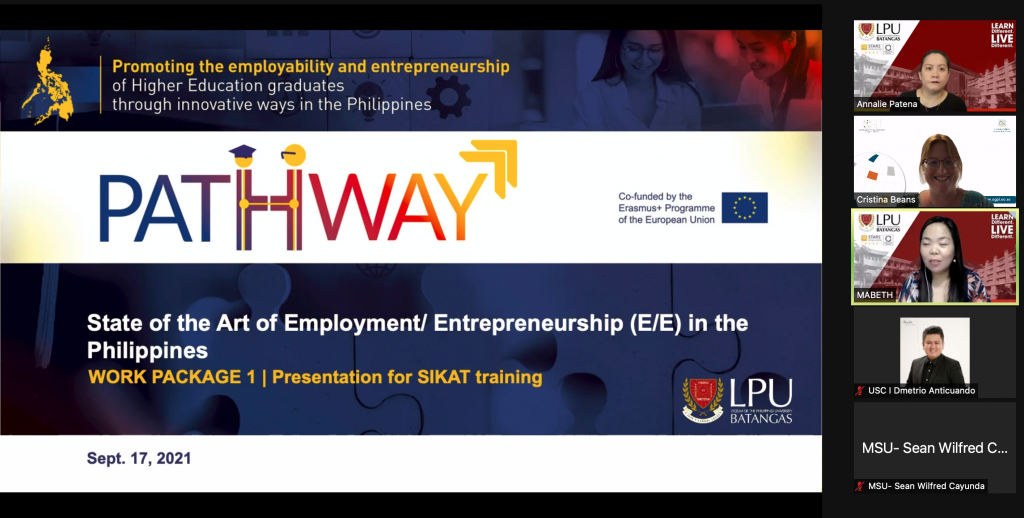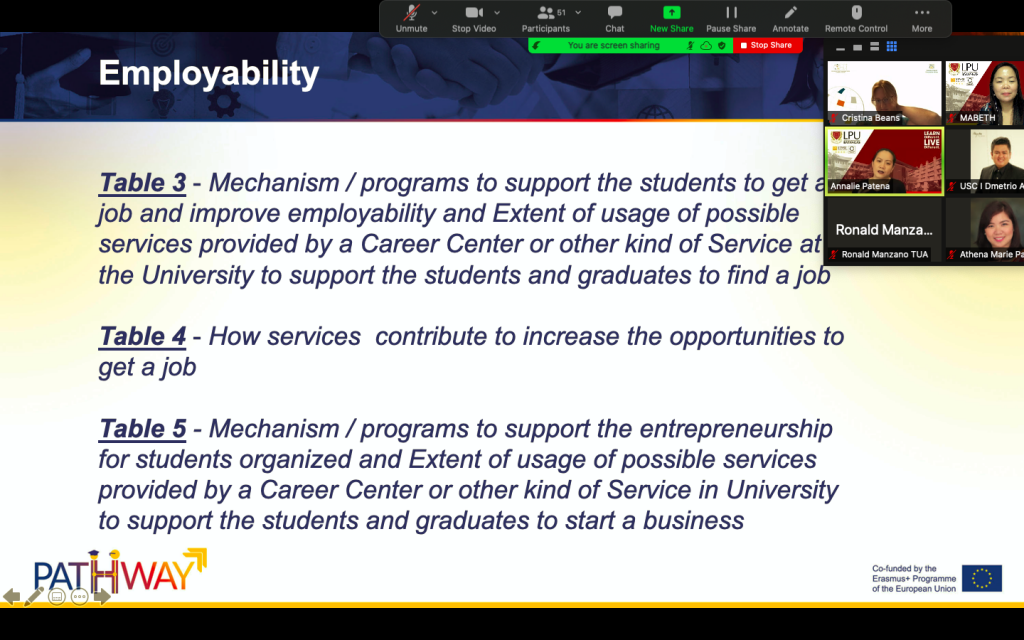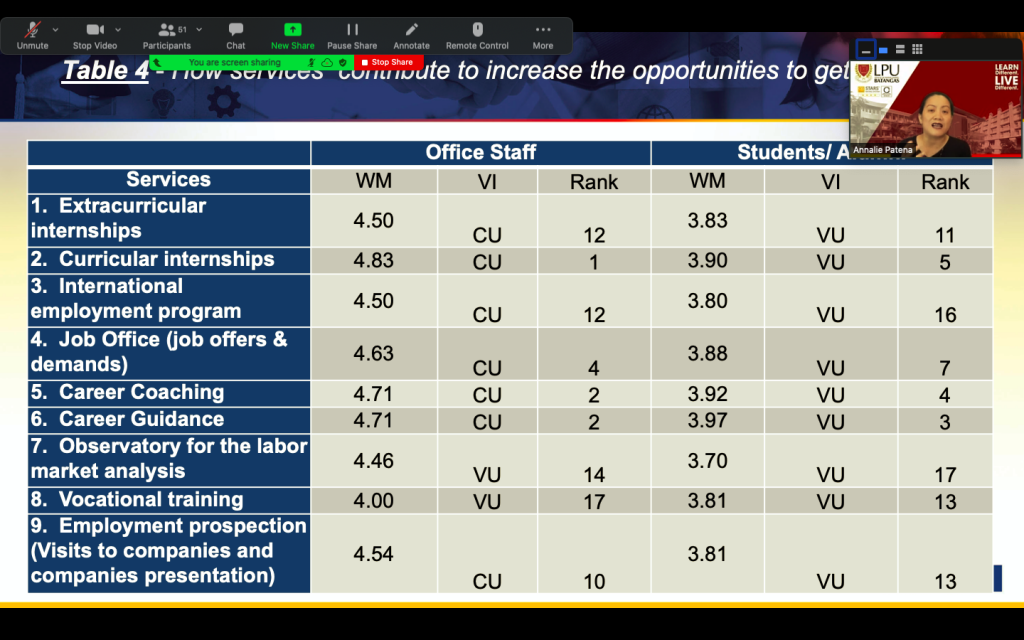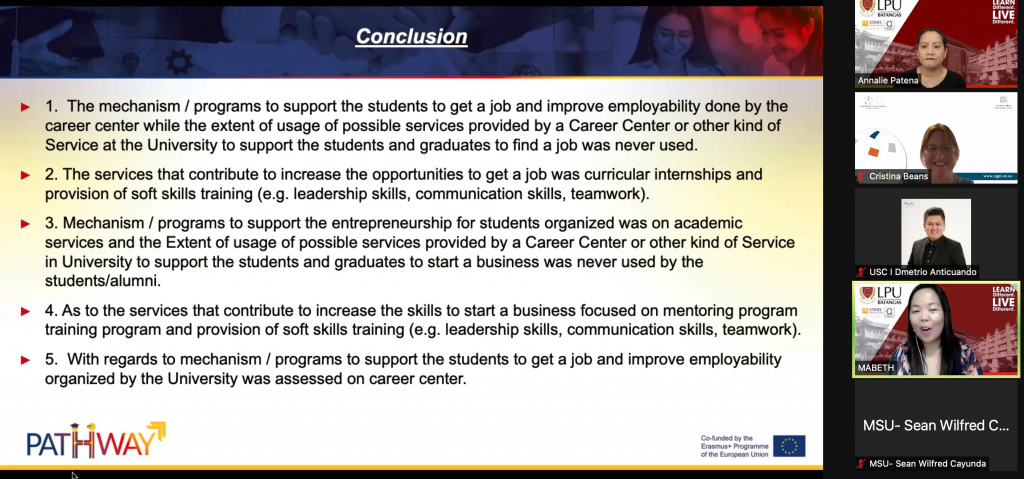Initial results of the State of the Art of Employment/Entrepreneurship in the Philippines were presented by Dr. Annalie D. Pateña, data analyst of the PATHWAY project from the LPU Batangas team last September 17, 2021. The presentation of results is part of the presentation of the SIKAT training module on employability, employment, and entrepreneurship delivered by PATHWAY’s project manager, Ms. Cristina Beans. The training was participated by more than 50 representatives from various Higher Education Institutions (HEIs) in the country.
The study highlights the state of the art employment and employability situation in the Philippines, current practices of Employability and Entrepreneurship in HEIs in preparing students for the market needs, and creating employment opportunities for students in the Philippines. It is important to note that the Philippines is moving towards the goal as a nation with better entrepreneurship culture and the fastest employability. The report which is divided into 2 parts was participated by 1157 students and alumni from different Philippine HEIs.
The first part of Employability covers a) mechanism/programs to support the students to get a job and improve employability, b) services that contribute to increasing the opportunities to get a job, c) mechanism/ programs to support the entrepreneurship for students organized and extent of usage of possible services provided by a Career Center or other kind of Service in University to support the students and graduates to start a business, d) How these services contribute to increasing the skills to start a business, e) Mechanism/programs to support the students to get a job and improve employability organized by the University (Students/Alumni), f) Level of importance of each factor in the success of obtaining a job for Philippine university graduates, and, g) Factors based on the labor market and national regulations that can be barriers to graduates securing employment.
Whereas, the second part of Entrepreneurship covers a) Demographic profile of the Respondents, b) Level of Importance to create a better context to develop entrepreneurial culture, c) Personal Factors that may contribute to entrepreneurship development, d) Social Factors that may contribute to entrepreneurship development, e )Economic Factors that may contribute to entrepreneurship development, f) Psychological Factors that may contribute to entrepreneurship development, g) Political/LegalFactors that may contribute to entrepreneurship development, h) Entrepreneurial Competencies in terms of Personal, i) Entrepreneurial Competencies in terms of Domain, j) Entrepreneurial Competencies in terms of Organization, k) Entrepreneurial Competencies in terms of Strategy and Management, and, l) Entrepreneurial Competencies in terms of Relationship.
The result shows that the extent of usage of possible services provided by a Career Center or other kind of Service in the University to support the students and graduates to find a job was never used. Meanwhile, the provision of soft skills training (e.g., leadership skills, communication skills, teamwork) was very useful and contribute to increasing the opportunities to get a job as well as to increase the skills to start a business. Some office staff and students place essential importance on graduates’ ability to learn and adapt as a factor in the success of obtaining a job in the country. Lack of job vacancies was the common factor that can be a barrier to graduates securing employment. Consequently, they want to train professors on how to train students on entrepreneurship to have a better context in developing entrepreneurial culture. With the emerging needs, relationship and domain competencies must be enhanced to have a positive outlook on entrepreneurship. Thus, personal, social-economic, psychological, technological, and political/legal factors are needed to develop one’s entrepreneurial skills. In the world of globalization and open market economy, it is only through skills development, skill up-gradation, and skill adaptation of the youth that employment can be generated, national productivity improved, and sustainability of development ensured. Developing entrepreneurs among students are the answer for tackling the employability problem. Different universities in the Philippines need to be refurbished at once and stood start Business Incubators and the like.
Source: Study on the State of the Art of Employment/Entrepreneurship in the Philippines- SIKAT Project










